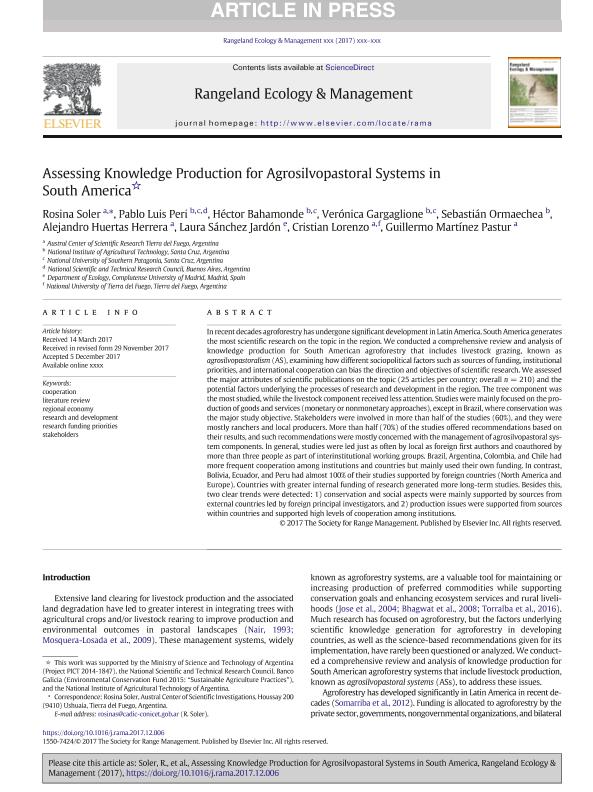Mostrar el registro sencillo del ítem
dc.contributor.author
Soler Esteban, Rosina Matilde

dc.contributor.author
Peri, Pablo Luis

dc.contributor.author
Bahamonde, Héctor Alejandro

dc.contributor.author
Gargaglione, Veronica Beatriz

dc.contributor.author
Ormaechea, Sebastián Gabriel

dc.contributor.author
Huertas Herrera, Alejandro

dc.contributor.author
Sánchez Jardón, Laura
dc.contributor.author
Lorenzo, Cristian A.

dc.contributor.author
Martínez Pastur, Guillermo José

dc.date.available
2019-10-31T19:40:09Z
dc.date.issued
2018-09
dc.identifier.citation
Soler Esteban, Rosina Matilde; Peri, Pablo Luis; Bahamonde, Héctor Alejandro; Gargaglione, Veronica Beatriz; Ormaechea, Sebastián Gabriel; et al.; Assessing Knowledge Production for Agrosilvopastoral Systems in South America; Society for Range Management; Rangeland Ecology and Management; 71; 5; 9-2018; 637-645
dc.identifier.issn
1550-7424
dc.identifier.uri
http://hdl.handle.net/11336/87773
dc.description.abstract
In recent decades agroforestry has undergone significant development in Latin America. South America generates the most scientific research on the topic in the region. We conducted a comprehensive review and analysis of knowledge production for South American agroforestry that includes livestock grazing, known as agrosilvopastoralism (AS), examining how different sociopolitical factors such as sources of funding, institutional priorities, and international cooperation can bias the direction and objectives of scientific research. We assessed the major attributes of scientific publications on the topic (25 articles per country; overall n = 210) and the potential factors underlying the processes of research and development in the region. The tree component was the most studied, while the livestock component received less attention. Studies were mainly focused on the production of goods and services (monetary or nonmonetary approaches), except in Brazil, where conservation was the major study objective. Stakeholders were involved in more than half of the studies (60%), and they were mostly ranchers and local producers. More than half (70%) of the studies offered recommendations based on their results, and such recommendations were mostly concerned with the management of agrosilvopastoral system components. In general, studies were led just as often by local as foreign first authors and coauthored by more than three people as part of interinstitutional working groups. Brazil, Argentina, Colombia, and Chile had more frequent cooperation among institutions and countries but mainly used their own funding. In contrast, Bolivia, Ecuador, and Peru had almost 100% of their studies supported by foreign countries (North America and Europe). Countries with greater internal funding of research generated more long-term studies. Besides this, two clear trends were detected: 1) conservation and social aspects were mainly supported by sources from external countries led by foreign principal investigators, and 2) production issues were supported from sources within countries and supported high levels of cooperation among institutions.
dc.format
application/pdf
dc.language.iso
eng
dc.publisher
Society for Range Management

dc.rights
info:eu-repo/semantics/openAccess
dc.rights
Atribución-NoComercial-CompartirIgual 2.5 Argentina (CC BY-NC-SA 2.5 AR)
dc.rights.uri
https://creativecommons.org/licenses/by-nc-sa/2.5/ar/
dc.subject
COOPERATION
dc.subject
LITERATURE REVIEW
dc.subject
REGIONAL ECONOMY
dc.subject
RESEARCH AND DEVELOPMENT
dc.subject
RESEARCH FUNDING PRIORITIES
dc.subject
STAKEHOLDERS
dc.subject.classification
Otras Ciencia Política

dc.subject.classification
Ciencia Política

dc.subject.classification
CIENCIAS SOCIALES

dc.title
Assessing Knowledge Production for Agrosilvopastoral Systems in South America
dc.type
info:eu-repo/semantics/article
dc.type
info:ar-repo/semantics/artículo
dc.type
info:eu-repo/semantics/publishedVersion
dc.date.updated
2019-10-17T14:11:43Z
dc.journal.volume
71
dc.journal.number
5
dc.journal.pagination
637-645
dc.journal.pais
Estados Unidos

dc.journal.ciudad
Boulder
dc.description.fil
Fil: Soler Esteban, Rosina Matilde. Consejo Nacional de Investigaciones Científicas y Técnicas. Centro Austral de Investigaciones Científicas; Argentina
dc.description.fil
Fil: Peri, Pablo Luis. Instituto Nacional de Tecnología Agropecuaria; Argentina. Consejo Nacional de Investigaciones Científicas y Técnicas. Centro de Investigaciones y Transferencia de Santa Cruz. Universidad Tecnológica Nacional. Facultad Regional Santa Cruz. Centro de Investigaciones y Transferencia de Santa Cruz. Universidad Nacional de la Patagonia Austral. Centro de Investigaciones y Transferencia de Santa Cruz; Argentina
dc.description.fil
Fil: Bahamonde, Héctor Alejandro. Instituto Nacional de Tecnología Agropecuaria; Argentina. Universidad Nacional de la Patagonia Austral; Argentina
dc.description.fil
Fil: Gargaglione, Veronica Beatriz. Consejo Nacional de Investigaciones Científicas y Técnicas; Argentina. Universidad Nacional de la Patagonia Austral; Argentina. Instituto Nacional de Tecnología Agropecuaria; Argentina
dc.description.fil
Fil: Ormaechea, Sebastián Gabriel. Instituto Nacional de Tecnología Agropecuaria; Argentina. Universidad Nacional de la Patagonia Austral; Argentina
dc.description.fil
Fil: Huertas Herrera, Alejandro. Consejo Nacional de Investigaciones Científicas y Técnicas. Centro Austral de Investigaciones Científicas; Argentina
dc.description.fil
Fil: Sánchez Jardón, Laura. Universidad Complutense de Madrid; España
dc.description.fil
Fil: Lorenzo, Cristian A.. Universidad Nacional de Tierra del Fuego. Instituto de Ciencias Polares, Recursos Naturales y Ambiente; Argentina. Consejo Nacional de Investigaciones Científicas y Técnicas. Centro Austral de Investigaciones Científicas; Argentina
dc.description.fil
Fil: Martínez Pastur, Guillermo José. Consejo Nacional de Investigaciones Científicas y Técnicas. Centro Austral de Investigaciones Científicas; Argentina
dc.journal.title
Rangeland Ecology and Management

dc.relation.alternativeid
info:eu-repo/semantics/altIdentifier/url/https://www.sciencedirect.com/science/article/pii/S155074241730180X
dc.relation.alternativeid
info:eu-repo/semantics/altIdentifier/doi/http://dx.doi.org/10.1016/j.rama.2017.12.006
Archivos asociados
